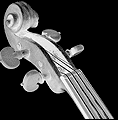

Jang Juxtaposition Despair as much as disparity inspires the music of Jon Jang '78. The murder of a Chinese-American man on the eve of his wedding and the urgency of Asian-American redress are emotional wellsprings as deeply felt as the American black experiences that informed the works of Duke Ellington and John Coltrane. In Jang's harmonic world, the heart of Paul Robeson beats alongside the rhythmic discourse of Beijing Opera star Mei Lanfang. This makes perfect sense – the first Chinese music Jang reports hearing was Robeson singing, in 1941, the Chinese national anthem with a Chinese choir.  The
arc of Jang's musical evolution ranges from the austerity of the avant-garde
to a haunting spiritualism, and there is room for East and West, art
and politics, to co-exist. His work during the 1980s, he told an Oberlin
audience during his February visit to campus, was "a musical
diary of the Asian-American movement." The
arc of Jang's musical evolution ranges from the austerity of the avant-garde
to a haunting spiritualism, and there is room for East and West, art
and politics, to co-exist. His work during the 1980s, he told an Oberlin
audience during his February visit to campus, was "a musical
diary of the Asian-American movement." Throughout the next decade, his musical diary explored the kinship between Chinese sorrow songs and African-American spirituals. It is this voice for justice, heard in his musical compositions dealing with capital punishment, anti-Asian violence in the United States, China's pro-democracy forces, and other socio-political issues, that inspired the Oberlin College Alumni Association to honor Jang with its Distinguished Achievement Award. He is the first Conservatory graduate to be so honored. Jang, who as an Oberlin student studied composition with Wendell Logan, professor of African-American music, and piano with Wilbur Price, was presented with the award during his February visit by Clyde Owan '79, president-elect of Oberlin's Alumni Association. Owan noted that Jang has demonstrated in his life "success that reflects Oberlin's values in careers, volunteer activities, and in life generally." Saxophonist David Murray, founder of the World Saxophone Quartet and a member of the Jon Jang Sextet, accompanied Jang for part of his three-day residency. They performed in Finney Chapel and offered a master class for jazz-studies students. Jang also delivered a public lecture on his work. In 1998, JAZZIZ magazine recognized Jang as one of the 150 artists in the world who have changed jazz since 1983. He was recently awarded a Meet the Composer residency grant to serve as composer-in-residence at the Bay Area's Asian Pacific Cultural Center and he has received commissions from the Library of Congress, the Kronos Quartet, and the Walker Art Center in Minneapolis, among others. When Jang was leading the Pan Asian Arkestra, his first ensemble, Bill Shoemaker wrote in The American Prospect that he had "a lengthy track record as a composer thoroughly versed in jazz and traditional Chinese lexicons." As artistic director of the Beijing Trio, which features drummer Max Roach, Jang has played concert halls and music festivals in China, Europe, South Africa, Japan, and Canada. This fall the trio will again perform in China and Japan. Jang is co-founder of Asian Improv Records and Asian Improv Arts, which have helped Asian-American artists explore the new jazz dialect during the last decade, promoting new musical directions by Asian Americans. His discography includes more than 10 recordings as a leader or collaborator. Two Flowers on a Stem, recorded in 1996 for Soul Note records, features Oberlin Assistant Professor of Jazz Percussion Billy Hart. Jang's most recent CDs on Asian Improv are Beijing Trio, Self-Portrait, and, with Anthony Brown and the Asian American Orchestra, the Duke Ellington-Billy Strayhorn classic The Far East Suite, which received a 1999 Grammy nomination for Best Jazz Ensemble Performance. |